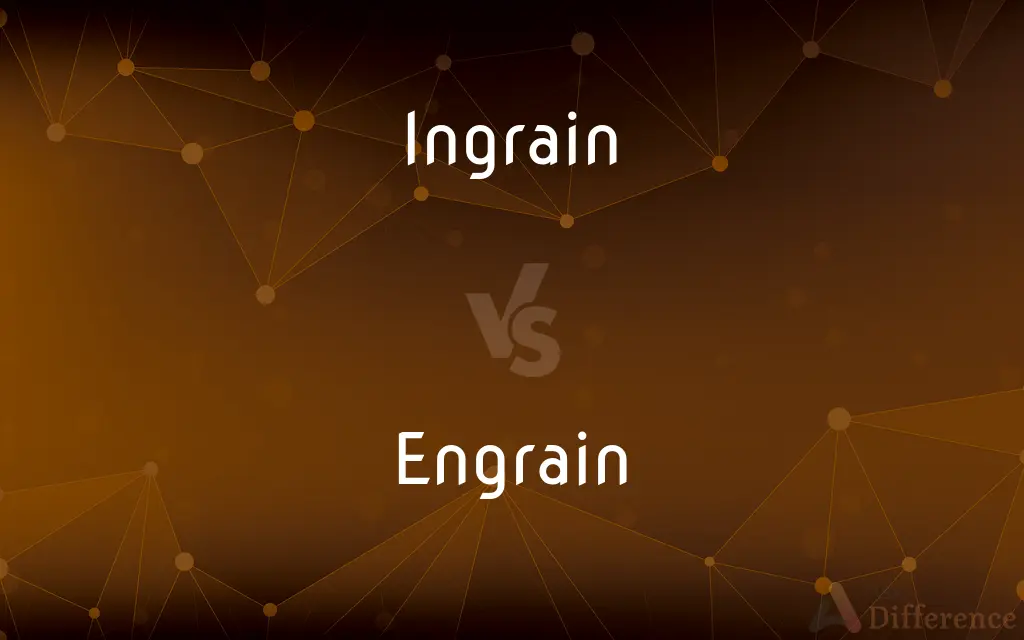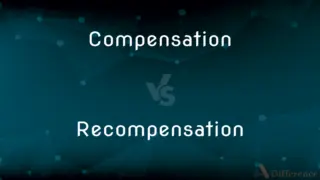Ingrain vs. Engrain — What's the Difference?
By Fiza Rafique & Urooj Arif — Updated on March 27, 2024
Ingrain refers to embedding something deeply within a substance or culture, ensuring it's firmly established; engrain is a less commonly used variant spelling of ingrain, carrying the same meaning of deeply embedding qualities, habits, or ideas.

Difference Between Ingrain and Engrain
Table of Contents
ADVERTISEMENT
Key Differences
Ingrain and engrain essentially convey the same concept—embedding something so deeply that it becomes an inseparable part of the whole. "Ingrain" is the more traditionally preferred term, especially in contexts like "ingrained habits" or "ingrain carpet," emphasizing the depth and permanence of an impression or characteristic. On the other hand, "engrain" is recognized as an alternate spelling that is less commonly used but understood in the same contexts.
In the realm of textiles, "ingrain" describes a method or quality of dyeing where color is deeply embedded into fabric fibers, ensuring durability and resistance to fading. While "engrain" is less frequently used in this context, the principle behind the term remains consistent—aiming for permanence and resilience.
The use of "ingrain" in cultural or behavioral contexts highlights the deep embedding of beliefs, habits, or values within an individual or society. Similarly, when "engrain" is used, it carries the same implication of deeply incorporating such aspects into the fabric of one's character or a collective ethos.
In contemporary usage, "ingrain" appears more frequently in written and spoken communication, reflecting its acceptance and preference in the English language. "Engrain," while understood, tends to be employed less often, and its usage may vary by region or stylistic preference.
Regardless of spelling, the essence of both terms underscores the concept of deep, enduring integration whether it be of color in materials, values in individuals, or practices in communities. The choice between "ingrain" and "engrain" often comes down to personal or editorial preference, without altering the intended meaning.
ADVERTISEMENT
Comparison Chart
Definition
To embed deeply within a substance or culture.
Variant spelling of ingrain with same meaning.
Usage
More common, especially in textiles and cultural contexts.
Less commonly used variant.
Context
Used to describe deep embedding of habits, values, or dye in fabric.
Same as ingrain, with identical contexts.
Preference
Preferred in formal writing and communication.
Employed based on regional or stylistic choice.
Implication
Emphasizes durability, resistance to change, or deep cultural embedding.
Carries the same implications as ingrain.
Compare with Definitions
Ingrain
To embed deeply within a substance or culture.
The values taught in childhood are often ingrained for life.
Engrain
Reflects stylistic or regional preferences in spelling.
The use of engrain over ingrain varies by publication standards.
Ingrain
Used metaphorically to describe enduring habits or beliefs.
Honesty is ingrained in their family's traditions.
Engrain
Alternate spelling of ingrain, meaning to deeply embed.
Respect for nature is engrained in the community's philosophy.
Ingrain
Indicates a deep integration into the fabric of something.
The tradition of storytelling is ingrained in the culture.
Engrain
Less commonly used but understood in the same contexts as ingrain.
The concept of hard work is engrained from an early age.
Ingrain
Suggests permanence and resistance to fading or change.
The artist's unique style is ingrained in every painting.
Engrain
Implies a deep, lasting impact on character or practice.
The importance of education is engrained in society.
Ingrain
Refers to a dyeing method where color is deeply embedded in fabric.
Ingrain fabrics retain their color even after multiple washes.
Engrain
Sometimes seen in discussions about textiles or culture.
Engrain colors demonstrate the skill of traditional dyers.
Ingrain
To fix deeply or indelibly, as in the mind
"A system that had been ingrained for generations could not be easily undone by change from the top" (Doris Kearns Goodwin).
Engrain
To ingrain.
Ingrain
(Archaic) To dye or stain into the fiber of.
Engrain
Alternative spelling of ingrain
Ingrain
Deep-seated; ingrained.
Engrain
To dye in grain, or of a fast color. See Ingrain.
Leaves engrained in lusty green.
Ingrain
Made of predyed fibers; thoroughly dyed
Ingrain yarn.
Engrain
To incorporate with the grain or texture of anything; to infuse deeply. See Ingrain.
The stain hath become engrained by time.
Ingrain
Made of fiber or yarn dyed before weaving. Used especially of rugs.
Ingrain
Yarn or fiber dyed before manufacture.
Ingrain
An ingrain rug or carpet.
Ingrain
(transitive) To dye with a fast or lasting colour.
Ingrain
To make (something) deeply part of something else.
The dirt was deeply ingrained in the carpet.
The lessons I learned at school were firmly ingrained in my mind.
Ingrain
Dyed with grain, or kermes.
Ingrain
Dyed before manufacture; said of the material of a textile fabric; hence, in general, thoroughly inwrought; forming an essential part of the substance.
Ingrain
An ingrain fabric, such as a carpet.
Ingrain
Dyed with grain, or kermes.
Ingrain
Dyed before manufacture, - said of the material of a textile fabric; hence, in general, thoroughly inwrought; forming an essential part of the substance.
Ingrain
An ingrain fabric, as a carpet.
Ingrain
To dye with or in grain or kermes.
Ingrain
To dye in the grain, or before manufacture.
Ingrain
Thoroughly work in;
His hands were grained with dirt
Ingrain
Produce or try to produce a vivid impression of;
Mother tried to ingrain respect for our elders in us
Common Curiosities
Why might someone choose to use engrain instead of ingrain?
The choice might stem from regional spelling preferences, stylistic decisions, or simply personal inclination, without altering the intended meaning.
Is there a difference between ingrain and engrain?
There is no difference in meaning; "engrain" is simply an alternate spelling of "ingrain," though "ingrain" is more commonly used.
What does it mean to ingrain something?
To ingrain something means to embed it deeply within a substance, individual, or culture so that it becomes a permanent part.
How do you ingrain a habit?
Ingraining a habit typically involves consistent practice and reinforcement until the habit becomes a natural part of one’s routine.
Can engrain be used in formal writing?
Yes, "engrain" can be used in formal writing, but "ingrain" is the preferred form in most editorial standards.
How does ingrained differ in use when talking about textiles versus personal habits?
In textiles, it refers to the permanence of dye within fibers; in personal habits or cultural practices, it describes qualities or beliefs deeply embedded in a person or society.
What is the significance of ingraining values in education?
Ingraining values in education is crucial for shaping individuals’ character and guiding their ethical and moral judgments.
In what contexts can you use ingrain?
"Ingrain" can be used in both tangible and metaphorical contexts, from describing the durability of dyed fabrics to the deep embedding of values or habits.
What is an example of something that can be ingrained in a culture?
Practices like communal dining or storytelling can be ingrained in a culture, reflecting deep-rooted traditions.
Can the spelling choice between ingrain and engrain affect readability?
The choice might affect readability slightly, depending on the audience's familiarity with the variant, but it doesn't change the understanding.
What does it mean when a technique is ingrained in practice?
It means the technique has become a fundamental, often indispensable part of the practice, deeply integrated and routinely used.
Is it correct to say a color is engrained in fabric?
While "ingrain" is more commonly associated with textiles, saying a color is engrained is understood to mean the color is permanently embedded.
Are ingrained characteristics easy to change?
Characteristics that are ingrained are often resistant to change, as they are deeply embedded within an individual's or group's nature.
How is ingrained used in psychology?
In psychology, ingrained might refer to deeply embedded beliefs or behaviors that significantly influence one’s actions and perceptions.
Can engrain be considered outdated?
While less common, "engrain" isn't necessarily outdated but is a less preferred spelling variant of "ingrain."
Share Your Discovery

Previous Comparison
Compensation vs. Recompensation
Next Comparison
Ethicality vs. EthicalnessAuthor Spotlight
Written by
Fiza RafiqueFiza Rafique is a skilled content writer at AskDifference.com, where she meticulously refines and enhances written pieces. Drawing from her vast editorial expertise, Fiza ensures clarity, accuracy, and precision in every article. Passionate about language, she continually seeks to elevate the quality of content for readers worldwide.
Co-written by
Urooj ArifUrooj is a skilled content writer at Ask Difference, known for her exceptional ability to simplify complex topics into engaging and informative content. With a passion for research and a flair for clear, concise writing, she consistently delivers articles that resonate with our diverse audience.
















































